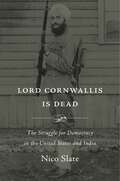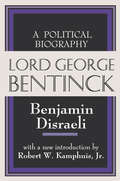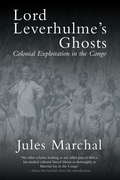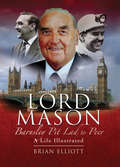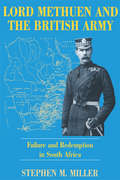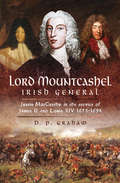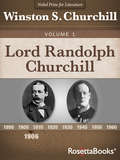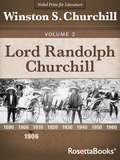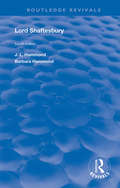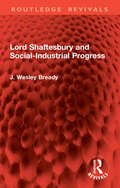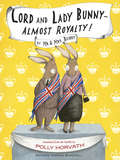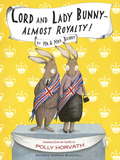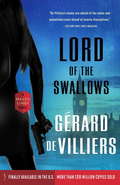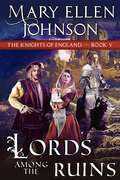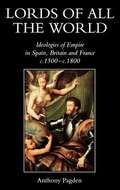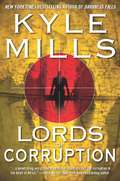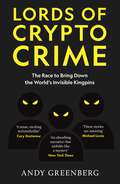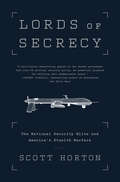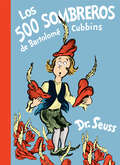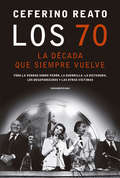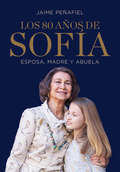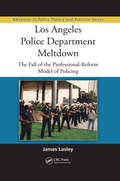- Table View
- List View
Lord Cornwallis Is Dead: The Struggle for Democracy in the United States and India
by Nico SlateDo democracies bring about greater equality among their citizens? India embraced universal suffrage in 1947 and yet its citizens are far from realizing equality. The U.S. struggles with intolerance and inequality well into the twenty-first century. Nico Slate offers a new look at the struggle for freedom that linked two former British colonies.
Lord George Bentinck: A Political History
by Benjamin DisraeliLord George Bentinck is an account of Disraeli's relation with his parliamentary colleague and friend. It is not simply an account of the battle over the Corn Laws with Sir Robert Peel, but a most remarkable book, extremely readable, and full of often quoted and apt comments and descriptions. As a vivid story of one of the great parliamentary dramas in British history it is unsurpassed. The portraits of both Bentinck and Peel are both sympathetic and just. The book provides insight into mid-nineteenth century parliamentary life that remains unsurpassed.It is hard to overstate the bitterness and fury which Peel's decision to repeal the Corn Laws had provoked in British politics. One biographer of Disraeli, Robert Blake, spoke of "Home Rule in 1886 and Munich in 1938 as the nearest parallels". Friendships were sundered, families divided, and the feuds of politics carried into private life to a degree quite unusual in British history. Those who are interested in the details of parliamentary warfare which raged until Peel's fall from power should consult Lord George Bentinck. But the worth of this book goes beyond constitutional history or even the Irish food famine. Disraeli helps explain the intellectual and ideological grounds of the Young England Movement: a conservative force that aimed at a union of discontented industrial workers with aristocratic landowners and against factious Whigs, selfish factory owners and dissenting shopkeepers. In forging such a policy of principle, the Conservatives, as Disraeli's book well demonstrates, became a minority party but one which carried the full weight of moral politics.
Lord Leverhulme's Ghosts: Colonial Exploitation in the Congo
by Jules MarchalIn the early twentieth century, the worldwide rubber boom led British enterpreneur Lord Leverhulme to the Belgian Congo. Warmly welcomed by the murderous regime of King Leopold II, Leverhulme set up a private kingdom reliant on the horrific Belgian system of forced labor, a program that reduced the population of Congo by half and accounted for more deaths than the Nazi Holocaust. In this definitive, meticulously researched history, Jules Marchal exposes the nature of forced labor under Lord Leverhulme’s rule and the appalling conditions imposed upon the people of Congo. With an extensive introduction by Adam Hochschild, Lord Leverhulme’s Ghosts is an important and urgently needed account of a laboratory of colonial exploitation.
Lord Mason, Barnsley Pitlad to Peer: A Life Illustrated
by Brian ElliottRoy Mason swapped the colliery for Westminster when elected MP for Barnsley in 1953. He went on to become one of the leading figures in the Labour Party during the 1960s and 1970s, holding a number of prestigious offices including Defence Secretary from 1974 and Secretary of State for Northern Ireland from 1976. This photographic biography presents images from Mason's own archive charting his personal and political life from the Yorkshire pits to the House of Lords.
Lord Methuen and the British Army: Failure and Redemption in South Africa
by Stephen M. MillerThis study analyzes the readiness of the British military establishment for war in 1899 and its performance in the South African War (1899-1902). It focuses on the career of Field Marshal Paul Sanford, 3rd Baron Methuen, whose traditional military training, used so effectively in Queen Victoria's small wars, was put to the test by the modern challenges of the South African War. A subsidiary aim of this work is to correct and refine the historical consensus that Methuen's campaing in the South African War was plagued by practical errors and poor judgement. The South African War was a crucial transitional episode in the history of the British army. Unlike Great Britain's other expeditions, it required the concentrated resources of the entire empire. It was a modern war in the sense that it employed the technology, the weaponry, the communications, and the transportation of the second industrial revolution.
Lord Mountcashel: Justin MacCarthy in the Service of James II and Louis XIV, 1673–1694
by D. P. GrahamJustin MacCarthy (later Lord Mountcashel) was born into a notable family of Irish Jacobites, loyal to the exiled Stuarts, and grew up in France. Their Irish land was regained after the Restoration of Charles II but Justin, as the youngest surviving son, sought a career in the French army (as both his father and oldest brother had done). In 1673 he joined an Irish regiment in French service. He served under the legendary French marshals Turenne and Conde against the Dutch and their Imperial allies and by 1676 was commanding the regiment. He became part of the personal circle of the Catholic Duke of York, the future James II and, after the latters accession in 1685, Justin helped to transform the Irish army into a Catholic one.When James II was deposed in the Glorious Revolution of 1688 and fled via France to Ireland, Justin was one of the most experienced commanders resisting Williams invasion. Unfortunately MacCarthy was defeated at the Battle of Newtownbutler (1689), wounded and captured. He escaped and again went into exile in France, where he was the first commander of the famous Irish Brigade until his death in 1694.
Lord Randolph Churchill Volume 1 (Lord Randolph Churchill #1)
by Winston S. ChurchillThe first volume of the Nobel Prize-winning Prime Minister&’s biography of his father, the fiery Conservative Party leader of late Victorian Britain. In 1906, Sir Winston Churchill produced a two-volume biography of his father Lord Randolph Churchill, the 19th century Member of Parliament whose political career ended in scandal. This first volume deals with early events in Randolph&’s life, including his upbringing, his education, and his election to the House of Commons as the Conservative MP for Woodstock. This volume also recount&’s Randolph&’s quarrel with the Prince of Wales in a daring gambit to protect the integrity of the Churchill family name. This episode resulted in Churchill&’s temporary exile from British high society, a prequel to his later disgrace. While Winston Churchill is clearly a supporter of his father&’s, he is not afraid to be honest about the mistakes and failures of his career and personal life.
Lord Randolph Churchill Volume 2 (Lord Randolph Churchill #2)
by Winston S. ChurchillThe second volume of the Nobel Prize-winning Prime Minister&’s biography of his father, the controversial Victorian era British MP. In 1906, Sir Winston Churchill produced a two-volume biography of his father Lord Randolph Churchill, the 19th century Member of Parliament whose political career ended in scandal. This second volume detail&’s the elder Churchill&’s emergence as an independent leader who challenged the old guard of his own Conservative Party. As an obscure and overlooked backbench MP, Randolph established a cohort of Tory rebels known as the &“fourth party.&” Though excluded from British high society, he nevertheless made a name for himself and rose to become Chancellor of the Exchequer. But as he was on course to run for Prime Minister, his confrontational style led to a career-ending blunder.
Lord Shaftesbury (Routledge Revivals)
by Barbara Hammond J. L. HammondOriginally published in 1923, this book covers the career of Lord Shaftesbury from his early career, through Peel's government and factory legislation, and onto religion and philanthropy. His name recalls great achievements in the reform of law; a powerful force in debates and contests, on the issue of which depended the fortunes of England, and he helped to both create and destroy institutions, habits and beliefs to great consequence of his successors.
Lord Shaftesbury and Social-Industrial Progress (Routledge Revivals)
by J. Wesley BreadyOriginally published in 1926, this volume is much more than a biography of an outstanding politician, social reformer and philosopher. It provides an analysis of the history of social conditions in England during the nineteenth century, as well as a discussion of the development of social affairs and the inertia of political psychology. The role that faith and religion played in motivating Lord Shaftesbury’s desire for social reform is also discussed as is the ways in which he and John Wesley transformed the social and ethical ideas of England to enshrine in law many of the working conditions that we take for granted today such as defined hours of work and rest periods.
Lord and Lady Bunny — Almost Royalty!: Almost Royalty!
by Polly HorvathLiterature’s most endearing rabbits are back in this sequel to Mr. and Mrs. Bunny — Detectives Extraordinaire! While the Bunnys' human friend, Madeline, worries about saving money for college, Mrs. Bunny is more concerned about how to become a queen.Unexpectedly, Madeline’s family inherits a sweet shop (candy store!) in England, and it looks for a while as if everyone’s problems are solved. England proves to be full of eccentric characters, strange customs, and even royalty — but holding onto money is difficult for Madeline’s family, and becoming a queen proves harder than Mrs. Bunny had expected.Lord and Lady Bunny is written by Mr. and Mrs. Bunny,* translated from the Rabbit by multi-award-winning author Polly Horvath, and beautifully illustrated by Sophie Blackall. It’s a sequel that children will laugh over and love.* Mr. and Mrs. Bunny lives in Rabbitville in the Cowichan Valley on Vancouver Island, British Columbia. They have twelve children.
Lord and Lady Bunny--Almost Royalty!
by Polly Horvath Sophie BlackallIn this hilarious sequel to Mr. and Mrs. Bunny--Detectives Extraordinaire!--that even includes a guest appearance by J. K. Rowling a.k.a. "Oldwhatshername"--Madeleine wants nothing more than to save money for college, but her impractical, ex-hippie parents are broke. When the family unexpectedly inherits a sweet shoppe in England that has the potential to earn serious profit, they see an answer to all their problems. . . . Meanwhile, Mr. and Mrs. Bunny--formerly of the detecting persuasion--are looking for new professions, and Mrs. Bunny decides she would like to be Queen. Soon they, too, are headed across the pond. Brought to you by National Book Award-winning author Polly Horvath and illustrator Sophie Blackall, the adventures of Madeleine and the Bunnys are zanier than ever.
Lord of the Swallows
by Gérard De VilliersA sexy, high-stakes thriller in which Malko Linge must choose between his sense of duty and his sense of honor. At a benefit dinner in Monaco, Austrian playboy and CIA freelancer Malko Linge meets an intriguing woman, Zhanna Khrenkov, who has an unusual proposal. She will disclose everything she knows about her husband Alexei's business, provided Malko kills Alexei's beautiful young British mistress. Appalled, he refuses, but then Zhanna reveals that her husband runs a ring of sleeper Russian spies, operating undercover inside the U.S. Naturally, Malko's CIA handlers would love to have this information, But he feels uncomfortable killing anyone in cold blood--especially a beautiful woman. Traveling from Vienna to London to Moscow and back, aided by his former CIA handler and sometime lover Gwyneth Robertson, Malko strives to avoid the crosshairs of deadly assassins and--almost as dangerous--jealous lovers.
Lords Among the Ruins: A Medieval Romance (The Knights of England Series #5)
by Mary Ellen JohnsonAs the Fourteenth-Century Closes, So Does the Rule of England's Most Tyrannical Monarch in the Medieval Historical, LORDS AMONG THE RUINS, by Mary Ellen JohnsonMedieval England from the Aftermath of 1381 Peasants’ Revolt to the Deposition and Murder of Richard II on 14 Feb 1400As the former boy king, Richard II, approaches his third decade, Matthew Hart and England’s other great lords struggle to deflect his more destructive impulses, which increasingly threaten the kingdom.Amidst attempted assassinations, growing civil war and political intrigue, Matthew Hart, his beloved wife, Margery Watson, and their offspring live and love and war their way through the last years of the fourteenth century, seeing the deposition and murder of England’s most tyrannical monarch.Publisher's Note: Readers with a passion for history will appreciate the author's penchant for detail and accuracy. In keeping with the era, this story contains scenes of brutality which are true to the time and man's timeless inhumanity. There are a limited number of sexual scenes and NO use of modern vulgarity.From the Author: There is nothing new under the sun. If we seek to understand today’s events, history will always provide the answer. By 1398 the megalomaniacal Richard II had consolidated his power, executed or banished all his enemies and destroyed all those who might speak out in opposition to him. Two years later Richard was deposed, thrown into a dungeon in Pontefract Castle and starved to death. Lessons: We can never predict the future; actions always have unintended consequences; we sow the seeds of our own destruction and payback’s a bitch!THE KNIGHTS OF ENGLAND, in series orderThe Lion and the LeopardA Knight There WasWithin A Forest DarkA Child Upon The ThroneLords Among the Ruins
Lords of All the World: Ideologies of Empire in Spain, Britain and France c. 1500-c. 1800
by Anthony PagdenThis book compares the theories of empire as they emerged in, and helped to define, the great colonial powers of Spain, France and Britain. Pagden describes how the rulers of the three countries claimed to be 'Lord of all the world'.
Lords of Corruption
by Kyle MillsWhen an obscure charity recruits Josh Hagarty to manage their activities in a wartorn region of Africa, he is eager to sign on and atone for a past he regrets. After a lifetime of bad luck, someone is finally giving him a chance. All he has to do is not blow it.He tries to lose himself in his new job, but soon the precariousness of his situation becomes impossible to ignore. Gideon, the man assigned to guide him through the dangerous and exotic world he's been thrust into, is revealed to be a psychotic thug with ties to the country's genocidal dictator. And Josh's predecessor didn't quit as Josh had been led to believe, but was found dismembered in the jungle after asking questions that no one wanted answered.Worse yet, Josh eventually realizes he has become an unwitting player in a billion-dollar conspiracy with tentacles snaking across the globe. Escape is impossible -the only way out is to bring the whole institution down.With the help of Annika Gritdal, a beautiful Scandinavian aid worker, and journalist JB Flannary, Josh pits himself against an American criminal organization backed by a dictator who is virtually omnipotent within the borders of his country. As his own survival becomes less and less likely, Josh realizes that his life is just one of thousands-perhaps millions-at stake.
Lords of Crypto Crime: The Race to Bring Down the World’s Invisible Kingpins
by Andy Greenberg'Reads like a thriller... These stories are amazing.'-Michael Lewis, #1 New York Times bestselling author of The Big Short'A master-class in the tactics and countertactics of financial cyberwarfare, laid out in a tense, exciting technothriller.'-Cory Doctorow, author of Little Brother'An absorbing narrative than unfolds like a mystery'-New York Times Book Review (Editors' Choice) 'Immensely readable... a romp through some of the most infamous dark web takedowns in recent memory.'-Washington PostDirty cops, trafficking rings, globe-spanning, nail-biting undercover detective work and the biggest takedown of the online narcotics market in the history of the internet. This is the story of how a single innovation has fuelled the world's criminal financial markets, and unleashed a cat-and mouse game like no other.Over the last decade, crime lords inhabiting lawless corners of the internet have operated more freely - whether in drug dealing, money laundering, or human trafficking - than their old school counterparts could have ever dreamed of. By transacting in currencies with anonymous ledgers, overseen by no government and beholden no bankers, they have robbed law enforcement of the primary method of cracking down on illicit finance: following the money.But what if this dark economy held a secret, fatal flaw? What if their currency wasn't so cryptic after all? Could an investigator using the right mixture of technical wizardry, financial forensics, and old-fashioned persistence uncover an entire criminal underworld?Lords of Crypto Crime is the gripping, insider story of how a brilliant group of investigators took down the biggest kingpins of the dark web.** Published in the US as Tracers in the Dark. **
Lords of Crypto Crime: The Race to Bring Down the World’s Invisible Kingpins
by Andy Greenberg'Reads like a thriller... These stories are amazing.'-Michael Lewis, #1 New York Times bestselling author of The Big Short'A master-class in the tactics and countertactics of financial cyberwarfare, laid out in a tense, exciting technothriller.'-Cory Doctorow, author of Little Brother'An absorbing narrative than unfolds like a mystery'-New York Times Book Review (Editors' Choice) 'Immensely readable... a romp through some of the most infamous dark web takedowns in recent memory.'-Washington PostDirty cops, trafficking rings, globe-spanning, nail-biting undercover detective work and the biggest takedown of the online narcotics market in the history of the internet. This is the story of how a single innovation has fuelled the world's criminal financial markets, and unleashed a cat-and mouse game like no other.Over the last decade, crime lords inhabiting lawless corners of the internet have operated more freely - whether in drug dealing, money laundering, or human trafficking - than their old school counterparts could have ever dreamed of. By transacting in currencies with anonymous ledgers, overseen by no government and beholden no bankers, they have robbed law enforcement of the primary method of cracking down on illicit finance: following the money.But what if this dark economy held a secret, fatal flaw? What if their currency wasn't so cryptic after all? Could an investigator using the right mixture of technical wizardry, financial forensics, and old-fashioned persistence uncover an entire criminal underworld?Lords of Crypto Crime is the gripping, insider story of how a brilliant group of investigators took down the biggest kingpins of the dark web.** Published in the US as Tracers in the Dark. **(P)2024 Octopus Publishing Group
Lords of Secrecy: The National Security Elite and America's Stealth Warfare
by Scott HortonForty years ago, a majority of Americans were highly engaged in issues of war and peace. Whether to go to war or keep out of conflicts was a vital question at the heart of the country's vibrant, if fractious, democracy. But American political consciousness has drifted. In the last decade, America has gone to war in Iraq and Afghanistan, while pursuing a new kind of warfare in Yemen, Somalia, Libya, and Pakistan. National security issues have increasingly faded from the political agenda, due in part to the growth of government secrecy.<P> In lucid and chilling detail, journalist and lawyer Scott Horton shows how secrecy has changed the way America functions. Executive decisions about war and peace are increasingly made by autonomous, self-directing, and unaccountable national security elites. Secrecy is justified as part of a bargain under which the state promises to keep the people safe from its enemies, but in fact allows excesses, mistakes, and crimes to go unchecked. Bureaucracies use secrets to conceal their mistakes and advance their power in government, invariable at the expense of the rights of the people. Never before have the American people had so little information concerning the wars waged in their name, nor has Congress exercised so little oversight over the war effort. American democracy is in deep trouble.<P> Lords of Secrecy explores the most important national security debates of our time, including the legal and moral issues surrounding the turn to private security contractors, the sweeping surveillance methods of intelligence agencies, and the use of robotic weapons such as drones. Horton looks at the legal edifice upon which these decisions are based and discusses approaches to rolling back the flood of secrets that is engulfing America today.Whistleblowers, but also Congress, the public, and the media, play a vital role in this process.<P> As the ancient Greeks recognized, too much secrecy changes the nature of the state itself, transforming a democracy into something else. Horton reminds us that dealing with the country's national security concerns is both a right and a responsibility of a free citizenry, something that has always sat at the heart of any democracy that earns the name.
Lords of the Desert: The Battle Between the United States and Great Britain for Supremacy in the Modern Middle East
by James BarrA path-breaking history of how the United States superseded Great Britain as the preeminent power in the Middle East, with urgent lessons for the present dayWe usually assume that Arab nationalism brought about the end of the British Empire in the Middle East--that Gamal Abdel Nasser and other Arab leaders led popular uprisings against colonial rule that forced the overstretched British from the region. In Lords of the Desert, historian James Barr draws on newly declassified archives to argue instead that the US was the driving force behind the British exit. Though the two nations were allies, they found themselves at odds over just about every question, from who owned Saudi Arabia's oil to who should control the Suez Canal. Encouraging and exploiting widespread opposition to the British, the US intrigued its way to power--ultimately becoming as resented as the British had been. As Barr shows, it is impossible to understand the region today without first grappling with this little-known prehistory.
Lorenz: Breaking Hitler’s Top Secret Code at Bletchley Park
by Jerry Roberts Paddy O'ConnellThe breaking of the Enigma machine is one of the most heroic stories of the Second World War and highlights the crucial work of the codebreakers of Bletchley Park, which prevented Britain’s certain defeat in 1941. But there was another German cipher machine, used by Hitler himself to convey messages to his top generals in the field. A machine more complex and secure than Enigma. A machine that could never be broken. For sixty years, no one knew about Lorenz or ‘Tunny’, or the determined group of men who finally broke the code and thus changed the course of the war. Many of them went to their deaths without anyone knowing of their achievements. Here, for the first time, senior codebreaker Captain Jerry Roberts tells the complete story of this extraordinary feat of intellect and of his struggle to get his wartime colleagues the recognition they deserve. The work carried out at Bletchley Park during the war to partially automate the process of breaking Lorenz, which had previously been done entirely by hand, was groundbreaking and is recognised as having kick-started the modern computer age.
Los 500 sombreros de Bartolomé Cubbins (Classic Seuss)
by Dr. SeussEdición en español de uno de los primeros clásicos de Dr. Seuss, ¡un libro ideal para hablar acerca del acoso! Ahora con ilustraciones a todo color, la historia de este joven campesino y su trato injusto a manos del Rey Derwin es una de las primeras y menos conocidas obras de Dr. Seuss. Es, sin lugar a duda, singularmente «seussiano», y trata un tema que preocupó a este buen doctor a lo largo de toda su vida: el abuso de poder (como en Yoruga la Tortuga y ¡Horton escucha a Quién!) y el humor puro (como en El Gato Ensombrerado y muchos otros libros que escribió e ilustró). Tan actual hoy como cuando se publicó por primera vez en 1938, ¡este libro es ideal para los admiradores de Dr. Seuss y para dar comienzo a un diálogo sobre el acoso! Las ediciones rimadas, en español, de los clásicos de Dr. Seuss, publicadas por Random House, brindan la maravillosa oportunidad de disfrutar de sus historias a más de treinta y ocho millones de personas hispanohablantes en Estados Unidos. A Spanish edition of an early classic by Dr. Seuss book—perfect for discussions about bullying!Featuring all-new color-enhanced illustrations, this story about a young peasant and his unjust treatment at the hands of King Derwin is one of Dr. Seuss's earliest and lesser known works. It's nevertheless totally Seussian and addresses subjects the good doctor was passionate about throughout his life: the abuse of power (as in Yertle the Turtle and Horton Hears a Who!); rivalry (as in The Sneetches); and of course, zany good humor (as in The Cat in the Hat and the 43 other books he wrote and illustrated)! As timeless today as when it was first published in 1938, it's a perfect choice for Dr. Seuss fans and for sparking discussions about bullying!Random House's rhymed, Spanish-language editions of classic Dr. Seuss books make the joyful experience of reading Dr. Seuss books available for the more than 38 million people in the United States who speak Spanish.
Los 70, la década que siempre vuelve: Toda la verdad sobre Perón, la guerrilla, la dictadura, los desaparecidos y las otras víctimas
by Ceferino ReatoLa historia definitiva sobre los 70: la década en la que la Argentina llegó a naturalizar la violencia política y vivió horrores que aún estremecen. Toda la verdad sobre Perón, la guerrilla, la dictadura, los desaparecidos y las otras víctimas desde un punto de vista objetivo que presenta los hechos y se abstiene de interpretaciones simplistas. Pronto habrá pasado medio siglo y los argentinos seguiremos discutiendo una y otra vez sobre los 70. En efecto, los 70 siguen vivos, siempre vuelven. O nunca terminan de pasar. Esos años, verdadera orgía de sueños, ideales, sangre y muerte, vieron desfilar tres "patrias" por una misma nación: la socialista, que nunca llegó a nacer; la peronista, que se hizo añicos en poco tiempo; y la militar, cuyos horrores aún estremecen. No hay tragedia griega que se haya atrevido a tanto y, tal vez por eso, esa década -en la que la violencia política da la impresión de haber sido naturalizada- nos sigue interesando y atrayendo. Sin embargo, buena parte de lo dicho y escrito sobre ella lleva impresa la marca de la simplificación maniquea que presenta al pasado como una sucesión de episodios en el que batallan buenos y malos. En búsqueda de consuelo o justificación, unos y otros construyen su relato y, de ese modo, le hacen flaco favor a la historia. Y a la sociedad, porque ¿puede alguien arrogarse el monopolio del sufrimiento? Este libro sostiene que no. En él, Ceferino Reato renuncia a la interpretación y brinda a sus lectores los elementos para que hagan la propia. Logra así lo que parecía una empresa imposible: reunir todo el conocimiento objetivo sobre los 70 del que disponemos los argentinos hasta la fecha en una obra única, que conjuga la información rigurosa que hace justo su contenido con el pulso narrativo que hace apasionante su lectura.
Los 80 años de Sofía: Esposa, madre y abuela
by Jaime PeñafielCoincidiendo con la celebración de su ochenta aniversario, Jaime Peñafiel desvela un recorrido íntimo y personal repleto de fotografías familiares de la reina más sufridora, pero a la vez más querida por la opinión pública. Peñafiel repasa los acontecimientos más importantes de Sofía en su papel más desconocido: el de esposa, madre y abuela. Ochenta años dan para mucho: alegrías y llantos, momentos felices y otros no tan gozosos... Pero, sobre todo, es una buena ocasión para repasar lo vivido. Doña Sofía, reina emérita de España y, sin duda, el miembro más querido de la Familia Real española, tiene pocos motivos para celebrar su aniversario: sin apenas contacto con su marido, soporta como puede la humillación del destierro de su hija Cristina y el encarcelamiento de su yerno Iñaki Urdangarin. Y, por si no fuera suficiente, la relación con sus nietas Leonor y Sofía no es todo lo idílica que cabría esperar, como se demostró en el triste episodio de la catedral de Mallorca, que no lograron borrar con el paripé que la reina Letizia y la propia Sofía protagonizaron unos días después, simulando ser la familia ideal a las puertas del hospital adonde habían acudido para visitar a don Juan Carlos. Jaime Peñafiel, uno de los periodistas que mejor conoce a la soberana, nos repasa, capítulo a capítulo, la historia de su vida, una vida que poco tiene que ver con la de las reinas y princesas de los cuentos de hadas.
Los Angeles Police Department Meltdown: The Fall of the Professional-Reform Model of Policing
by James LasleyOnce considered among the most respected police departments in the world, the LAPD suffered a devastating fall from grace following the 1991 police officer beating of Rodney King and the Los Angeles riots stemming from the officers acquittal in 1992. Unique to the literature of policing, management, and policy studies, Los Angeles Police Departmen
